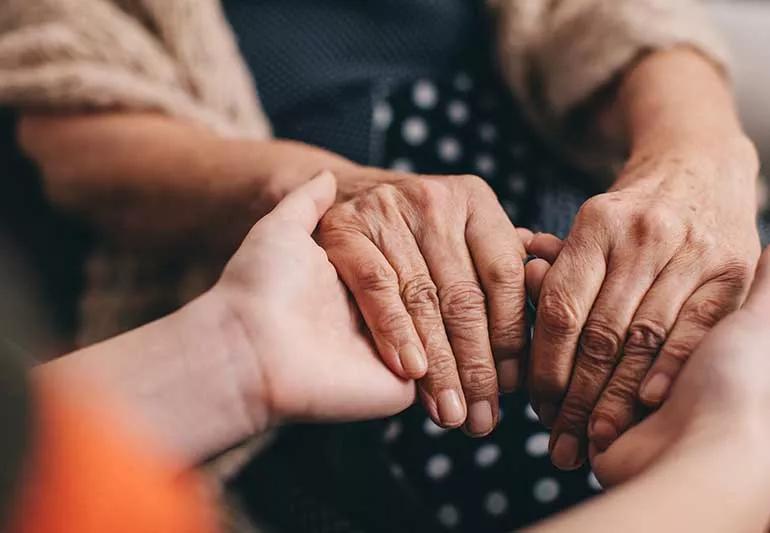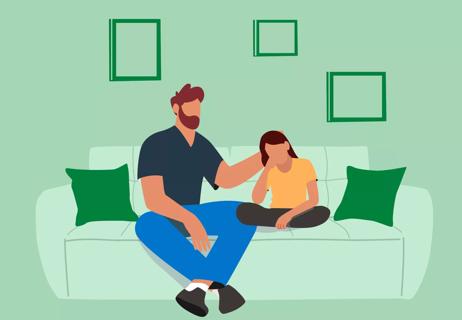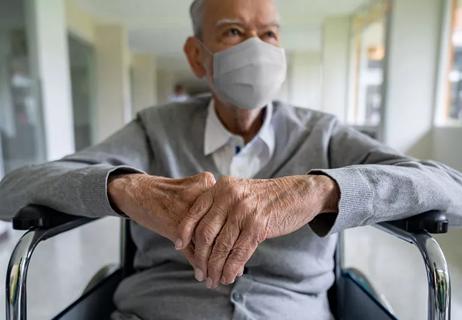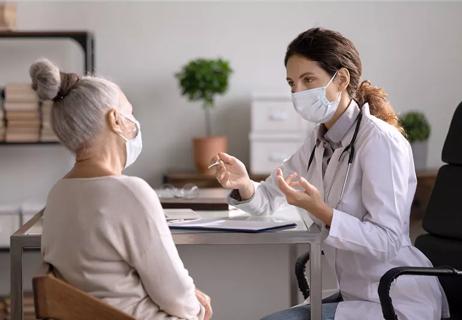Sometimes, you need help navigating your grief and the dying process

Death and dying aren’t always easy subjects. Conversations about your end-of-life desires and the legacy you want to leave behind can be particularly difficult for some individuals, as well as their family and friends.
Advertisement
Cleveland Clinic is a non-profit academic medical center. Advertising on our site helps support our mission. We do not endorse non-Cleveland Clinic products or services. Policy
If you’re diagnosed with a terminal illness, understanding how much time you have left and deciding how you’ll spend it can be difficult to navigate. For friends and family members — especially for young ones who’ve never experienced a death in their family — understanding what happens when someone dies can be confusing and challenging.
When we broach the topic of death, we’re forced to confront our own mortality and come to terms with what will happen to our bodies when we die. But when we face the death of a loved one, we’re confronted with a different set of challenges. Sometimes, we’re dealing with an impending death long before it happens. Other times, death happens swiftly and suddenly in the most unexpected ways.
No matter how someone dies, we each find different ways to grieve the loss of a loved one. Sometimes, we have to handle all the logistics around someone’s funerary services. And then, there are all the things left unfinished in the wake of that person’s death — their hobbies, their dreams, their bills and their responsibilities.
While dying can sometimes be a complicated experience, having help along the way to process your grief and understand what’s happening can make the act of dying more manageable. That’s where having an end-of-life doula can help.
Advertisement
Palliative medicine physician David Harris, MD, and end-of-life doula and social worker Anne O’Neill, LSW, CDP, explain how end-of-life doulas work together with palliative care and hospice teams, and exactly what you can expect when hiring an end-of-life doula.
Birth doulas and death doulas function like two sides of the same coin. A birth doula is a trained professional that assists someone before, during and after childbirth. They work alongside your healthcare team to provide emotional and physical support, education and guidance to make sure you have a positive birthing experience.
Similarly, a death doula — also known as an end-of-life doula, end-of-life coach, death midwife or death coach — assists a dying person and their loved ones before, during and after death. An end-of-life doula provides emotional and physical support, education about the dying process, preparation for what’s to come and guidance while you’re grieving.
“A doula wants to do as much as they possibly can to help facilitate what the person and their family need,” says O’Neill. “Doulas make sure the threads are connected between the dying person and the important people in their lives, including their hospice team.”
End-of-life doulas aren’t licensed to provide any medical assistance, but they may advocate for the dying person’s wishes and needs while working together with healthcare providers.
“There is value in having an interdisciplinary team, with the idea that different fields have different things they bring to the table,” notes Dr. Harris. “The best way to give great care to someone is to involve different viewpoints, different levels of expertise and different types of expertise. End-of-life doulas and religious leaders both fall into that framework.”
In recent years, as a result of the COVID-19 pandemic and the surge of related deaths worldwide, there’s been an increased interest in hiring end-of-life doulas to help those who were dying and those who were grieving. There’s also been an increased interest in people wanting to become licensed as end-of-life doulas.
“For many people who are approaching the end of life, being prepared and having everything in place for when they do die is a very important thing. They don’t want their families to be scrambling, and they have certain ideas about what they want their funeral to look like,” explains Dr. Harris.
“Usually, in palliative care or hospice, we give them the space and a listening person to help them plan out what they really want. For many, it’s not as much about finding a funeral home or finding resources as it is just a hard thing to talk about.”
Advertisement
And in many ways, the core function of an end-of-life doula is to be present and listen to the needs of the person who’s dying and the needs of those around them who are grieving.
“We don’t die twice. We only get one chance to do this,” says O’Neill. “When you’re bringing in a doula, you’re bringing in a wide range of experience and a real desire to want to be there with that person and to make it as good of an experience as it can be.”
Each dying person’s needs are unique to their specific situation, but the services offered by an end-of-life doula could include a mix of the following:
Advertisement
“Our goal is to provide the kind of support people need so that families aren’t exhausted. We want families to have a chance to rest and we want to ensure that people who are dying are not unsafe at home,” O’Neill adds.
Part of that process is making sure the person who’s dying is aware of what’s happening and, if they’re able or they desire it, to give them the space to confront their own grief and be an active participant in their dying process.
“A dying person is grieving their losses, too. They’ll never see their partners again. They’ll never do the things they love again. So, the doula allows a dying person to express their losses,” says O’Neill.
Along the way, an end-of-life doula may help with what’s referred to as “legacy work,” a process O’Neill says is about exploring the most meaningful moments of someone’s life and finding ways to pass on their legacy. Sometimes, this looks like putting together a scrapbook of memories. Other times, it’s about making those phone calls and writing those letters to long-lost friends or siblings and finding closure in other ways.
“Doulas can help facilitate those conversations to make sure they tie up those loose ends and they’re able to say what they want to say before it’s too late,” she explains. “I had one gentleman who always wore flannel shirts his whole life. He and I cut the buttons off of his flannel shirts and made bracelets for his granddaughters so that they would have those to remember him after he died.”
Advertisement
And end-of-life doulas can extend their services to those loved ones who are grieving by providing education and resources along the way. Sometimes, that means a doula may have to call the funeral home to announce the death of the person who died and make an appointment for the funeral. Other times, a doula may just be on standby should the family need their support during the final hours of a person’s life and in the weeks or months after they’ve died.
“Our hearts have to fill back up again after such a loss,” notes O’Neill. “As doulas, we’ve come to know these families, so we are able to give them what support they need afterward. We don’t just close the book and say, ‘On to the next one.’”
End-of-life doulas are similar to hospice care in that both offer counseling, spiritual support and other nonmedical services to help a dying person and their loved ones during their final days. The medical piece is what sets hospice care and end-of-life doulas apart because doulas are typically not licensed to provide any hands-on medical assistance. That said, doulas are fast becoming an integrated part of hospice care teams. If your hospice care team doesn’t have an in-house doula, if you decide to hire one, the hospice care team should work with them throughout the dying process.
“An end-of-life doula’s approach to care is very consistent with hospice care and they’re very synergistic,” says Dr. Harris. “Where end-of-life doulas excel seems to be advocating for people who are dying, planning and having some of those crucial conversations.
“The medical piece is just a small part of somebody’s end-of-life experience and we have to acknowledge, as healthcare providers, that sometimes the medical pieces aren’t the most important pieces. Sometimes, it’s connecting, from one human to another.”
There are a variety of accreditations available to those interested in becoming an end-of-life doula. Although there aren’t universally recognized requirements for becoming an end-of-life doula yet, organizations like the International End-Of-Life Doula Association and the National End-Of-Life Doula Alliance offer training and certification requirements that include:
“Individuals and their families are very vulnerable when they’re at the end of their lives, so that ethical piece really needs to be there and needs to be pronounced,” stresses O’Neill.
The decision to hire an end-of-life doula is a very personal decision, one that should be discussed with you and your family in the same manner of understanding and respect that any other end-of-life decisions should be discussed.
“It’s not easy being cared for. When you see your doctors, you’re expected to sort of be able to clarify and explain exactly what’s going on physically, emotionally, spiritually. At the same time, you’re not feeling well. So, that’s a really hard thing to do,” states Dr. Harris.
“Having somebody like a death doula who has experience taking care of people at the end of their lives and who has the time to sit and be with that person and help them figure out what’s going on can be really valuable.”

Sign up for our Health Essentials emails for expert guidance on nutrition, fitness, sleep, skin care and more.
Learn more about our editorial process.
Advertisement

This role designates a stand-in partner when you can’t make medical decisions for yourself

It’s best to be honest and straightforward while remaining age-appropriate

The short answer from a palliative care expert

The five phases of loss are denial, bargaining, anger, depression and acceptance — but they don’t always happen in that order

Palliative care offers a comprehensive network of support at any stage, from diagnosis to treatment and beyond

How best to cope with the loss of a furry friend

Infants are at high risk of severe RSV, but getting the vaccine during pregnancy helps protect them from it

This common sitting position for kids can cause problems with joint health, muscle development and motor coordination

Although it could be used as a moisturizer, this new trend is not recommended

Communicating clear limits helps protect your time, energy and emotional well-being

High cholesterol can be genetic, but testing and treatment can lower your heart disease risk